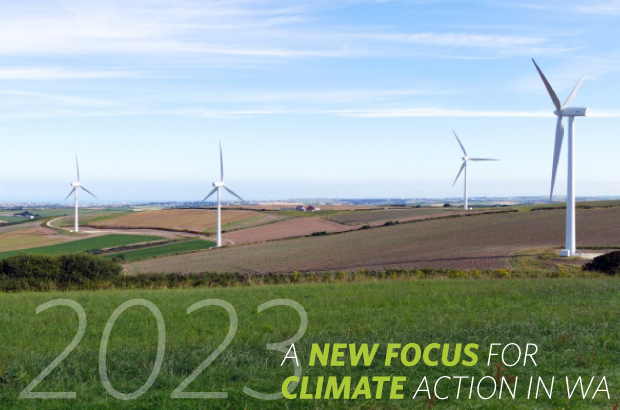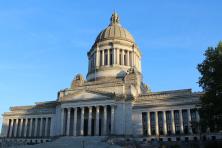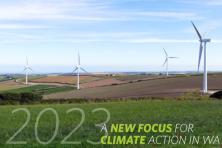Today kicks off the 2023 Washington legislative session.
It’s an exciting time to live in Washington! We have made remarkable progress on climate over the last few legislative sessions and now have one of the strongest climate policy frameworks in the nation (and world!). Washington is committed to transitioning away from fossil fuels and towards clean energy, thanks to the Legislature’s passage of several important policies: the Clean Energy Transformation Act transitions our grid to 100% Clean Electricity; the Clean Fuel Standard and Zero Emission Vehicle mandate ensure cleaner transportation fuels in Washington; and the Climate Commitment Act (CCA) puts a hard cap on climate pollution and will invest billions of dollars into our communities. Amazingly, all of these policies are in addition to the historic federal investments that Washingtonians will see from the federal infrastructure law and the Inflation Reduction Act. We are officially on the brink of truly transformational transition.
With strong policies now on the books, this year’s efforts on climate will look a little different than years past. Instead of what emissions reductions polices are in place, our policy advocacy will now focus on how we reduce emissions and who will benefit in the transition. It is still absolutely critical that we continue to act and raise our voices for climate action, prioritize equity, and ensure that all Washingtonians benefit from our clean energy future.
Here’s more on what Climate Solutions will be working on this WA session:
1. Invest in Climate Action
Washington’s transformative CCA went into effect on January 1st, 2023 and its cap-and-invest program will bring in billions of dollars for climate and clean energy. As the Legislature invests in climate action using these new funds, it is critical to spend dollars wisely on carbon reduction projects, improving air quality, and projects in overburdened communities and tribal communities. Below are two key investment opportunities that will reduce emissions while helping communities breathe cleaner air. This is an Environmental Priorities Coalition priority.
Transitioning to Zero-Emission Medium- & Heavy-Duty Vehicles
Greenhouse gas emissions from passenger vehicles have remained steady, but climate pollution from medium- and heavy-duty (MHD) vehicles—such as trucks, vans, and buses—has more than doubled since 1990. Diesel exhaust is responsible for 70% of the cancer risk from air pollution in Washington, so investments in this sector will also reduce toxic air pollution, which is largely concentrated in overburdened communities. Swiftly transitioning to zero-emission MHD vehicles to meet our greenhouse gas emissions requirements requires a multi-pronged approach to reduce upfront costs and ensure adequate charging or fueling infrastructure.
Electrifying Our Homes & Buildings
In recent years, Washington’s building emissions have grown at a faster rate than any other source of climate and have major implications for the health of those who spend time in homes or buildings with gas. Research shows that over 12% of current childhood asthma in the United States can be attributed to gas stove use, which is comparable to children’s risk of being exposed to secondhand smoke. To ensure equitable access to transitioning to electric heat pumps and other electric appliances, the Legislature should provide incentives for low- and middle-income (LMI) households, schools in overburdened communities, and small businesses.
2. Clean Energy Siting
Meeting our ambitious 95% greenhouse gas reduction requirement requires rapid development of clean energy. However, expansion of clean energy comes with a broad set of challenges: from the impact on wildlife, environment, and tribal resources to the potential for project delays during the permitting processes and environmental reviews. The Legislature can improve our siting process while protecting environmental oversight and increasing opportunities for public input. Options include increasing the state’s capacity to examine a growing number of clean energy project proposals, including additional funding and staffing for state agencies, the use of a programmatic environmental review across regions and technologies, and creating a streamlined permitting application process. These proposals should be paired with the creation of clean energy zones that identify least-conflict lands to minimize impact on the environment, overburdened communities, and tribal communities, while providing additional certainty to clean energy project developers.
3. Transportation Accessibility & Land Use Planning
Creating a clean and equitable transportation system requires a multifaceted approach that extends beyond just the electrification of our vehicles, but also includes reducing reliance on passenger vehicles and expanding access to various transportation options. To do so, we need adequate housing near jobs, services, and transit. The Legislature should facilitate transit-oriented development, end exclusionary zoning, and amend the Growth Management Act so all jurisdictions plan for climate change and reduce greenhouse gas emissions. This is an Environmental Priorities Coalition priority.
This is such an exciting time and we’re truly on the brink of seeing real, tangible clean energy investments and benefits that come with them in our communities. We’ll keep you updated with opportunities to engage and act on all these priorities.





